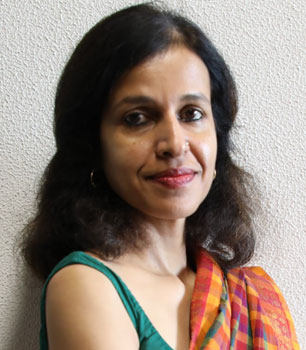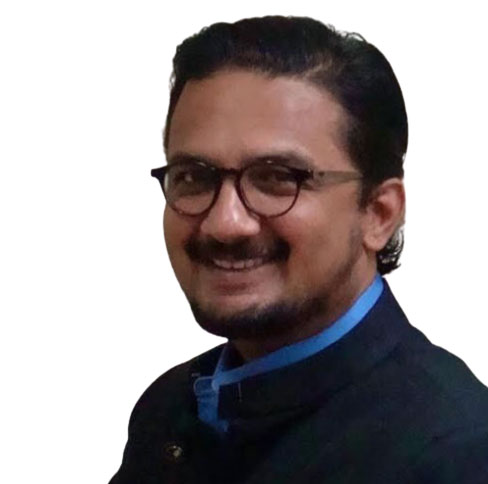
A Multi-Disciplinary
Online Certificate Programme
Exclusive Experience by Ashoka University
– Open for all Learners!
September 17, 2022 - December 21, 2022 (new applications are not accepted for this session)
Register for prospectus & application
Programme Overview and Experience
What is the story of India since its inception 75 years ago? How did its foundational politics shape what the country became? How can its subsequent social, economical and cultural trajectory tell us about where the country is today? After 75 years as a nation, what hopes, fears and progress can Indians look forward to? This fascinating multidisciplinary programme will look at all these questions and more, giving learners a comprehensive, analytical overview of India since independence. Led by some of India's leading scholars and public intellectuals, the programme has been uniquely crafted by Ashoka University, India's leading liberal arts and sciences university, to appeal to all learners, regardless of age or background.
12 WEEKEND MODULES | LIVE - ONLINE | 4 HOUR SESSIONS
Programme Faculty

Sunil Khilnani

Sunil Khilnani
Professor of Politics and History, Ashoka University
Ph. D. Cambridge University
Sunil Khilnani is a globally renowned scholar of politics and history.
He was the Founder and Director of the King’s India Institute at King’s College London from 2011 to 2019 . Prior to this he was Starr Foundation Professor at John Hopkins University, where he was the founder and director of South Asia Studies. He has also taught at Birkbeck University, London, and held several Visiting Professorships at Seikei University, Tokyo and at Princeton University.
He is the author of The Idea of India, and examination of the foundations of modern India that is recognized as a classic in its field. His most recent publication is Incarnations: India in 50 Lives, which was also a 50-part BBC Radio and podcast series: it recounts 2500 years of Indian history through the lives and thoughts of 50 individuals from the subcontinent.
He is currently Professor of Politics and History at Ashoka University and Dean of the AshokaX initiative.

Sunil Khilnani
Professor of Politics and History, Ashoka University
Ph. D. Cambridge University
Sunil Khilnani is a globally renowned scholar of politics and history.
He was the Founder and Director of the King’s India Institute at King’s College London from 2011 to 2019 . Prior to this he was Starr Foundation Professor at John Hopkins University, where he was the founder and director of South Asia Studies. He has also taught at Birkbeck University, London, and held several Visiting Professorships at Seikei University, Tokyo and at Princeton University.
He is the author of The Idea of India, an examination of the foundations of modern India that is recognized as a classic in its field. His most recent publication is Incarnations: India in 50 Lives, which was also a 50-part BBC Radio and podcast series: it recounts 2500 years of Indian history through the lives and thoughts of 50 individuals from the subcontinent.
He is currently Professor of Politics and History at Ashoka University and Dean of the AshokaX initiative.

Madhavi Menon

Dr. Madhavi Menon
Professor of English, Ashoka University
Director, Centre for Studies in Gender & Sexuality
Director of the PhD Programme in English
Ph.D. Tufts University
Madhavi Menon is an eminent theorist and scholar of gender, sexuality, politics, and identity.
She joined Ashoka University in 2013 as one of its founding faculty members. She went on to establish the university’s Centre for Gender & Sexuality Studies (CSGS), which is the first of its kind in India. Previously, she was a professor at Ithaca College and American University.
Most prominently known for her work on queer theory and Shakespeare, she has also edited the collection Shakesqueer and written three books on Shakespeare and sexuality. She is also most recently the author of Infinite Varieties: A History of Desire in India and Law of Desire: Rulings on Sex & Sexuality in India.
In addition to being Director of CSGS, she is the Director of the Ph.D. programme in English and Professor of English at Ashoka University.

Madhavi Menon
Professor of English, Ashoka University
Director, Centre for Studies in Gender & Sexuality
Director of the PhD Programme in English
Ph.D. Tufts University
Madhavi Menon is an eminent theorist and scholar of gender, sexuality, politics, and identity.
She joined Ashoka University in 2013 as one of its founding faculty members. She went on to establish the university’s Centre for Gender & Sexuality Studies (CSGS), which is the first of its kind in India. Previously, she was a professor at Ithaca College and American University.
Most prominently known for her work on queer theory and Shakespeare, she has also edited the collection Shakesqueer and written three books on Shakespeare and sexuality. She is also most recently the author of Infinite Varieties: A History of Desire in India and Law of Desire: Rulings on Sex & Sexuality in India.
In addition to being Director of CSGS, she is the Director of the Ph.D. programme in English and Professor of English at Ashoka University.

Rudrangshu Mukherjee

Dr. Rudrangshu Mukherjee
Chancellor, Professor of History, Ashoka University
D. Phil. Oxford University
Rudrangshu Mukherjee is an internationally renowned historian and author and the founding Vice-Chancellor of Ashoka University.
He was previously Editor, Editorial Pages of The Telegraph, Kolkata and has taught History at the University of Calcutta and held visiting appointments at Princeton University, the University of Manchester and University of California.
His works on the Revolt of 1857, beginning with Awadh in Revolt, 1857-58: A Study of Popular Resistance, and including his recent A Begum & A Rani: Hazrat Mahal and Lakshmibai in 1857 have become the standard reference in the field. He has also authored and edited several books on other themes, most significantly on the leaders and ideas that have made modern India, including The Penguin Gandhi Reader, New Delhi: The Making of a Capital, Great Speeches of Modern India, Nehru & Bose: Parallel Lives and most recently Tagore & Gandhi : Walking Alone, Walking Together.
Prof. Mukherjee is currently Chancellor and Professor of History at Ashoka University.

Rudrangshu Mukherjee
Chancellor, Professor of History, Ashoka University
D. Phil. Oxford University
Rudrangshu Mukherjee is an internationally renowned historian and author and the founding Vice-Chancellor of Ashoka University.
He was previously Editor, Editorial Pages of The Telegraph, Kolkata and has taught History at the University of Calcutta and held visiting appointments at Princeton University, the University of Manchester and University of California.
His works on the Revolt of 1857, beginning with Awadh in Revolt, 1857-58: A Study of Popular Resistance, and including his recent A Begum & A Rani: Hazrat Mahal and Lakshmibai in 1857 have become the standard references in the field. He has also authored and edited several books on other themes, most significantly on the leaders and ideas that have made modern India, including The Penguin Gandhi Reader, New Delhi: The Making of a Capital, Great Speeches of Modern India, Nehru & Bose: Parallel Lives and most recently Tagore & Gandhi : Walking Alone, Walking Together.
Prof. Mukherjee is currently Chancellor and Professor of History at Ashoka University.

Pulapre Balakrishnan

Pulapre Balakrishnan
Professor of Economics, Ashoka University
Ph.D. University of Cambridge
Professor Balakrishnan is a Professor of Economics at Ashoka University. He is also a Senior Fellow of the Indian Institute of Management, Kozhikode. His best known work includes Pricing and Inflation in India and Economic Growth in India: History and Prospect. He is most recently the author of India’s Economy from Nehru to Modi : A Brief History.
His previous appointments have been at Oxford University and the Indian Statistical Institute at Delhi. His professional assignments have included serving as the Country Economist for Ukraine at the World Bank, as well as consultant for the RBI, United Nations Development Program, and the International Labour Organization. He has written extensively in the media. Balakrishnan is the recipient of the Malcolm Adiseshiah Award for Distinguished Contribution to Development Studies (2014).

Pulapre Balakrishnan
Professor of Economics, Ashoka University
Ph.D. University of Cambridge
Professor Balakrishnan is a Professor of Economics at Ashoka University. He is also a Senior Fellow of the Indian Institute of Management, Kozhikode. His best known works include Pricing and Inflation in India and Economic Growth in India: History and Prospect. He is most recently the author of India’s Economy from Nehru to Modi : A Brief History.
His previous appointments have been at Oxford University and the Indian Statistical Institute at Delhi. His professional assignments have included serving as the Country Economist for Ukraine at the World Bank, as well as consultant for the RBI, United Nations Development Program, and the International Labour Organization. He has written extensively in the media. Balakrishnan is the recipient of the Malcolm Adiseshiah Award for Distinguished Contribution to Development Studies (2014).

Taylor C. Sherman

Dr Taylor C. Sherman
Associate Professor, London School of Economics Department of International History
Taylor Sherman is a historian, with a specialized focus on the cultural and political history of South Asia.
Initially teaching Extra-European History at Cambridge, she went on to hold a position as a postdoctoral fellow at Royal Holloway, University of London.
Her research is broadly interested in the dynamic interaction between social movements and governing institutions. She has previously published books on citizenship issues and margnizalied communities, such as Muslim Belonging in Secular India: Negotiating Citizenship in Postcolonial Hyderabad. Her most recent book, Nehru’s India: A History in Seven Myths, is published with the Princeton University Press and Penguin Random House India and will be released in the Autumn of 2022.
She is Professor of South Asian History at the Department of International History at the London School of Economics.

Dr. Taylor C. Sherman
Associate Professor, Department of International History, London School of Economics
Taylor Sherman is a historian, with a specialized focus on the cultural and political history of South Asia.
Initially teaching Extra-European History at Cambridge, she went on to hold a position as a postdoctoral fellow at Royal Holloway, University of London.
Her research is broadly interested in the dynamic interaction between social movements and governing institutions. She has previously published books on citizenship issues and margnizalied communities, such as Muslim Belonging in Secular India: Negotiating Citizenship in Postcolonial Hyderabad. Her most recent book, Nehru’s India: A History in Seven Myths, is published with the Princeton University Press and Penguin Random House India and will be released in the autumn of 2022.
She is Professor of South Asian History at the Department of International History at the London School of Economics.

Amita Baviskar

Dr Taylor C. Sherman
Associate Professor, London School of Economics Department of International History
Taylor Sherman is a historian, with a specialized focus on the cultural and political history of South Asia.
Initially teaching Extra-European History at Cambridge, she went on to hold a position as a postdoctoral fellow at Royal Holloway, University of London.
Her research is broadly interested in the dynamic interaction between social movements and governing institutions. She has previously published books on citizenship issues and margnizalied communities, such as Muslim Belonging in Secular India: Negotiating Citizenship in Postcolonial Hyderabad. Her most recent book, Nehru’s India: A History in Seven Myths, is published with the Princeton University Press and Penguin Random House India and will be released in the Autumn of 2022.
She is Professor of South Asian History at the Department of International History at the London School of Economics.

Amita Baviskar
Dean, Faculty and Professor of Environmental Studies and Sociology and Anthropology, Ashoka University
Ph.D. Cornell University
Amita Baviskar’s work on environmental change and social inequality has been fundamental to developing the field of environmental sociology in India. The Infosys Prize and several other honours recognize the importance of her research.
She has taught at the University of Delhi and the Institute of Economic Growth, and has been a visiting scholar at several universities including Stanford, Cornell, SciencesPo, and the University of Cape Town. She has served as a member of the Forest Advisory Committee of the Ministry of Environment and Forests.
Her books In the Belly of the River and Uncivil City and other works focus on resource rights, popular movements, and discourses on environmentalism spanning urban and rural geographies. She also writes on food, ecology and politics in scholarly as well as popular publications.
She is Professor of Environmental Studies and Sociology-Anthropology at Ashoka University.

Rita Kothari

Rita Kothari
Professor of English, Ashoka University
Director, MA in English Programme
Ph.D. Gujarat University
Rita Kothari is a multilingual scholar and translator whose work spans across different disciplines such as literature, cultural studies, anthropology, sociology, and history. Her questions emerge from observations of regions and communities in the western part of the Indian subcontinent—Gujarat, Kutch, and Sindh.
Her ethnographic research on marginal communities—through religion, caste, occupation, and gender—focuses upon narratives of identity, raising questions of both linguistic and cultural translation. Kothari has translated extensively from Gujarati and Sindhi into English, and occasionally vice versa. Her translations, as well as her edited volumes, have made significant contributions to the field of language politics and translation. Movement across languages, contexts, and cultures form the fulcrum of her interests, making translation the prism through which she sees the Indian context.
Her latest book, Uneasy Translations: Self, Experience and Indian Literature, interweaves her personal journey as an academic into reflections around self, language, and translation – with an eye upon the intangibly available category of experience. It is available here.

Rita Kothari
Professor of English, Ashoka University
Director, MA in English Programme
Ph.D. Gujarat University
Rita Kothari is a multilingual scholar and translator whose work spans across different disciplines such as literature, cultural studies, anthropology, sociology, and history. Her questions emerge from observations of regions and communities in the western part of the Indian subcontinent—Gujarat, Kutch, and Sindh.
Her ethnographic research on marginal communities—through religion, caste, occupation, and gender—focuses upon narratives of identity, raising questions of both linguistic and cultural translation. Kothari has translated extensively from Gujarati and Sindhi into English, and occasionally vice versa. Her translations, as well as her edited volumes, have made significant contributions to the field of language politics and translation. Movement across languages, contexts, and cultures form the fulcrum of her interests, making translation the prism through which she sees the Indian context.
Her latest book, Uneasy Translations: Self, Experience and Indian Literature, interweaves her personal journey as an academic into reflections around self, language, and translation – with an eye upon the intangibly available category of experience. It is available here.

Arvind Panagariya

Rita Kothari
Professor of English, Ashoka University
Director, MA in English Programme
Ph.D. Gujarat University
Rita Kothari is a multilingual scholar and translator whose work spans across different disciplines such as literature, cultural studies, anthropology, sociology, and history. Her questions emerge from observations of regions and communities in the western part of the Indian subcontinent—Gujarat, Kutch, and Sindh.
Her ethnographic research on marginal communities—through religion, caste, occupation, and gender—focuses upon narratives of identity, raising questions of both linguistic and cultural translation. Kothari has translated extensively from Gujarati and Sindhi into English, and occasionally vice versa. Her translations, as well as her edited volumes, have made significant contributions to the field of language politics and translation. Movement across languages, contexts, and cultures form the fulcrum of her interests, making translation the prism through which she sees the Indian context.
Her latest book, Uneasy Translations: Self, Experience and Indian Literature, interweaves her personal journey as an academic into reflections around self, language, and translation – with an eye upon the intangibly available category of experience. It is available here.

Arvind Panagariya
Professor of Economics and Jagdish Bhagwati Professor of
Indian Political Economy at Columbia University
PhD Princeton University
Arvind Panagariya is Professor of Economics and Jagdish Bhagwati Professor of
Indian Political Economy at Columbia University.
He served as the first Vice Chairman of the NITI Aayog, Government of India in the rank of a Cabinet Minister. During this time, he also served as India’s G20 Sherpa and led the Indian teams that negotiated the G20 Leaders’ Communiqués during presidencies of Turkey (2015), China (2016) and Germany (2017).
Professor Panagariya is a former Chief Economist of the Asian Development Bank and was on the faculty of the Department of Economics at the University of Maryland at College Park. During those years, he also worked with the World Bank, IMF and UNCTAD in various capacities.
Professor Panagariya is a prolific writer. He has authored or edited 20 books. The latest among them are Free Trade and Prosperity and India Unlimited. His book India: The Emerging Giant was listed as a top pick of 2008 by The Economist and described as the “definitive book on the Indian economy” by Fareed Zakaria of CNN. The Economist has described his book, Why Growth Matters, (with Jagdish Bhagwati) as “a manifesto for policymakers and analysts.”
Scientific papers by Professor Panagariya have appeared in the top economics journals while policy papers by him have appeared in the Foreign Affairs and Foreign Policy. He writes a monthly column in the Times of India and his guest columns have appeared in the Financial Times, Wall Street Journal and India Today.
In March 2012, the Government of India honoured Professor Panagariya with Padma
Bhushan, the third highest civilian honours the country bestows in any field.
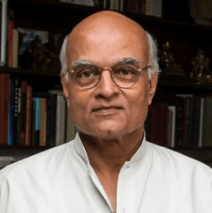
Shivshankar Menon
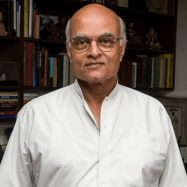
Shivshankar Menon
Visiting faculty of International Relations
Chair of the Ashoka Centre for China Studies
MA University of Delhi
Ambassador Shivshankar Menon is currently visiting professor at Ashoka University, India, and Chair of the Ashoka Centre for China Studies.
He was previously National Security Advisor 2010-2014; Foreign Secretary of India 2006-2009; and Indian Ambassador or High Commissioner to China, Pakistan, Sri Lanka and Israel.
He has published Choices: Inside the Making of Indian Foreign Policy in 2016 and India and Asian Geopolitics; The Past, Present (Brookings Press USA, & Penguin Random House India) in April 2021.

Shivshankar Menon
Visiting Faculty of International Relations
Chair of the Ashoka Centre for China Studies
MA University of Delhi
Ambassador Shivshankar Menon is currently visiting professor at Ashoka University, India, and Chair of the Ashoka Centre for China Studies.
He was previously National Security Advisor 2010-2014; Foreign Secretary of India 2006-2009; and Indian Ambassador or High Commissioner to China, Pakistan, Sri Lanka and Israel.
He has published Choices: Inside the Making of Indian Foreign Policy in 2016 and India and Asian Geopolitics; The Past, Present (Brookings Press USA, & Penguin Random House India) in April 2021.
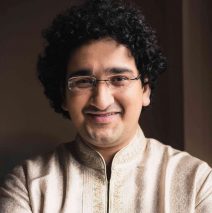
Vinay Sitapati

Vinay Sitapati
Associate Professor, Political Science and Legal Studies, Ashoka University
Ph.D. Princeton University
Vinay Sitapati is a political scientist and award-winning author, recognized as one of Apolitical’s global ‘100 Most Influential Academics in Government’.
After beginning his career as a journalist with The Indian Express he earned his Ph.D. in Politics from Princeton University where he continues to serve as Visiting Professor of Political Science.
He is the author of two best-selling books. His first book Half-Lion, a biography of Indian Prime Minister P.V. Narasimha Rao, was also named "A Book of the Year” by The Economist. His latest book, Jugalbandi: BJP Before Modi, traces how the BJP came to power today through an analysis of its past leaders, Vajpayee and Advani.
He also writes extensively for national and international publications, where he analyzes laws, provides on-ground coverage of the elections and dissects political campaigns.
He is currently an Associate Professor of Political Science and Legal Studies at Ashoka University.

Vinay Sitapati
Associate Professor, Political Science and Legal Studies, Ashoka University
Ph.D. Princeton University
Vinay Sitapati is a political scientist and award-winning author, recognized as one of Apolitical’s global ‘100 Most Influential Academics in Government’.
After beginning his career as a journalist with The Indian Express he earned his Ph.D. in Politics from Princeton University where he continues to serve as Visiting Professor of Political Science.
He is the author of two best-selling books. His first book Half-Lion, a biography of Indian Prime Minister P.V. Narasimha Rao, was also named "A Book of the Year” by The Economist. His latest book, Jugalbandi: BJP Before Modi, traces how the BJP came to power today through an analysis of its past leaders, Vajpayee and Advani.
He also writes extensively for national and international publications, where he analyzes laws, provides on-ground coverage of the elections and dissects political campaigns.
He is currently an Associate Professor of Political Science and Legal Studies at Ashoka University.
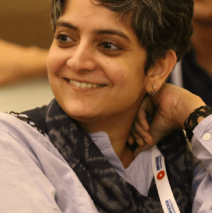
Mekhala Krishnamurthy
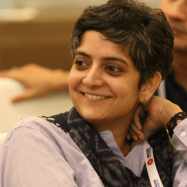
Mekhala Krishnamurthy
Associate Professor of Sociology and Anthropology, Ashoka University
Ph.D. University College, London
Mekhala Krishnamurthy is an eminent anthropologist and sociologist whose research lies at the intersection of social and civil concerns, public welfare, and government policies. She has been recognized as one of Apolitical’s global ‘100 Most Influential Academics in Government’.
She held a postdoctoral fellowship at University of Pennsylvania, where she is currently a non-resident Visiting Scholar at the Center for the Advanced Study of India (CASI). After that, she went on to teach at Shiv Nadar University. She also holds the position of Senior Fellow at Central Policy for Research.
Through CPR, she is currently leading the State Initiative Capacity, which is a project on strengthening democratic institutions at the federal level. She was also the principal co-investigator of an initiative for CASI, looking into the state of agricultural markets in Punjab, Bihar, and Odisha. Her book project and monograph are focused on the agrarian market in Madhya Pradesh.
She is Associate Professor of Sociology and Anthropology in Ashoka University.
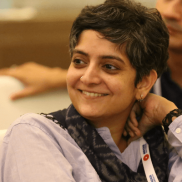
Mekhala Krishnamurthy
Associate Professor of Sociology and Anthropology, Ashoka University
Ph.D. University College, London
Mekhala Krishnamurthy is an eminent anthropologist and sociologist whose research lies at the intersection of social and civic thought and action, public welfare, economic life, and government policies. She has been recognized as one of Apolitical’s global ‘100 Most Influential Academics in Government’.
She is Senior Fellow at the Centre for Policy for Research, New Delhi, where she leads the State Initiative Capacity, a major interdisciplinary research and practice programme committed to deepening and expanding our understanding of the challenges and possibilities of building state capacity in democratic and federal India. She is also a widely recognised ethnographer of agricultural markets and agrarian economy and society. Based on long-term fieldwork, she is completing a book exploring the changing social, economic, and political lives and relationships of an agricultural market/mandi in the central Indian state of Madhya Pradesh and is co-author of a major interdisciplinary study of agricultural markets, agro-commodity networks, and farmers’ incomes in Punjab, Bihar, and Odisha.
Trained at Harvard, Cambridge and University College London, where she completed her PhD in Anthropology as a UCL Global Excellence Scholar, she has also held a postdoctoral fellowship at University of Pennsylvania, where she is currently a non-resident Visiting Scholar at the Center for the Advanced Study of India (CASI). She was a member of the founding departmental faculty at the Department of Sociology at Shiv Nadar University before joining Ashoka as Associate Professor of Sociology and Anthropology.
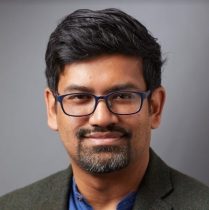
Rohit De

Amita Baviskar
Dean, Faculty and Professor of Environmental Studies and Sociology and Anthropology, Ashoka University
Ph.D. Cornell University
Amita Baviskar’s work on the politics of environmental changes and social inequity has been fundamental to developing the field of environmental sociology in India.
She has held teaching positions in the University of Delhi and the Institute of Economic Growth, as well as been a visiting scholar at several universities including Stanford, Cornell, SciencesPo, and the University of Cape Town. Her work on the environment also earned her a position as a member of the Forest Advisory Committee of the Ministry of Environment and Forests.
Her first book In the Belly of the River and her other works focus on resource rights, popular movements, and discourses on environmentalism spanning urban and rural geographies. She also writes on food and politics for academic journals, as well as contributing pieces on current issues to publications like Economic and Political Weekly.
She is Head of Environmental Studies, as well as Professor of Environmental Studies and Anthropology at Ashoka University.

Rohit De
Associate Professor, Department of History, Yale University PhD Princeton University
Rohit De is a lawyer and historian of modern South Asia and focuses on the legal history of the Indian subcontinent and the common law world.
He held the Mellon Postdoctoral Fellow at the Centre for History and Economics and then became a fellow of Trinity Hall at the University of Cambridge. After that, he began to work at Yale University.
His scholarship ranges across questions of decolonisation and nationalism, comparative constitutional law, and South Asian as well as global histories of law. He was awarded a Carnegie fellowship to conduct research on social movement lawyering during civil liberty movements for Rights from the Left: Decolonisation, Diasporas and a Global History of Rebellious Lawyering. His book, A People's Constitution: Law and Everyday Life in the Indian Republic, won several awards for its analysis of how the Indian constitution suffuses the imagination of its people. His second book further studied how the ordinary citizens of India engaged with the making of the constitution in Assembling the Indian Constitution. Rohit De has also been directly involved in shaping legal reforms in his time assisting Chief Justice K.G. Balakrishnan of the Supreme Court of India and working on constitution reform projects in Nepal and Sri Lanka.
He is Associate Professor at the Department of History and an Associate Research Scholar in the Law School at Yale University.
Want to know more?
Our team will be happy to answer any questions you might have or help you with the enrollment process.
Sep 17 - Dec 21, 2022
programme fee: ₹50,000 + GST
Who Should Take This Programme?
ashoka advantage
Register to receive Prospectus & Application
Submit Application with a simple Statement of Purpose
Once selected, complete payment to join Cohort
A Transformative Learning Experience

“A great cohort, exciting professors, a bit of theory, a bit of practical, everything blended together as a unique experience……and I think at this stage of my life doing something like this energises!”
UMA BALAKRISHNAN,
CHIEF DESIGNER







